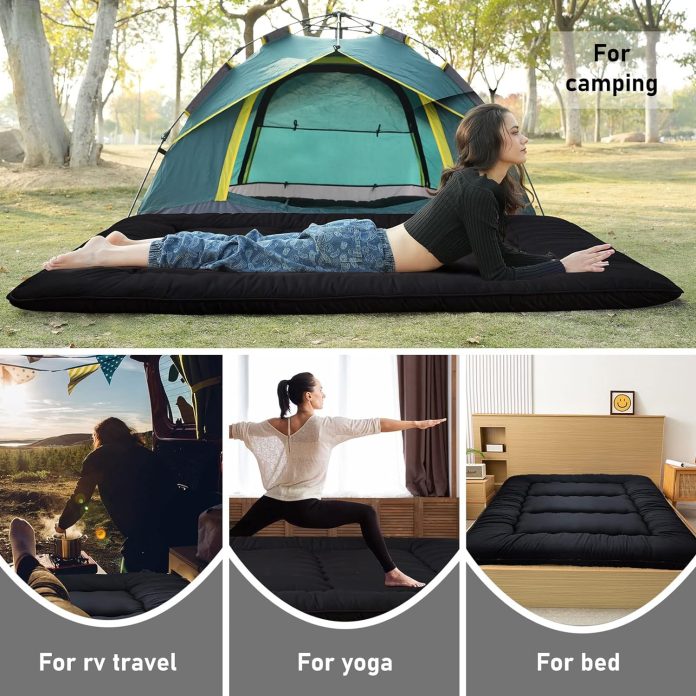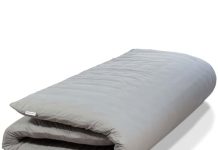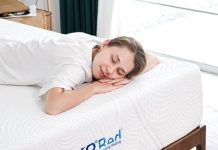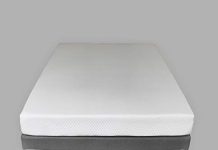Imagine yourself lying on a cozy floor mattress, gazing at the star-studded night sky, or waking up to birds chirping outside your camping or RV adventure. But wait, how thick should a floor mattress be for such outdoor escapades?
Finding the perfect mattress thickness can make all the difference in ensuring a comfortable and rejuvenating experience.
In this article, we explore the ideal thickness for floor mattresses specifically designed for camping or RV use, providing valuable insights to help you make the best decision for your next outdoor endeavor.
Review contents
Factors to consider
Terrain
When choosing a floor mattress for camping or RV use, it’s essential to consider the terrain you’ll be sleeping on. If you plan to camp in rocky or uneven ground areas, a thicker mattress can provide better support and cushioning.
Weight capacity
Consider the weight capacity of the mattress to ensure it can support the combined weight of all users. This is particularly important for RV use, as the mattress will need to support the occupants and any additional items or equipment stored on the bed.
Comfort
Comfort is critical when it comes to a good night’s sleep. Look for a floor mattress with adequate cushioning and support for your preferred sleeping position. This can vary from person to person, so it’s essential to consider individual preferences.
Insulation
If you plan on camping in colder climates, insulation is crucial. Thicker mattresses generally provide better insulation, helping to keep you warm throughout the night. Look for materials that have good thermal properties to ensure maximum comfort.
Storage space
Storage space is often limited in both camping and RV environments. Consider the size and foldability of the mattress to ensure it can be easily stored when not in use. Thinner mattresses tend to be more compact and more accessible to store.
Price
Price is always a factor to consider when making a purchase. Determine your budget and find a floor mattress that offers the best features and affordability for your needs.
Types of floor mattresses
Foam mattresses
Foam mattresses are popular for camping and RV use due to their lightweight and compact nature. They provide excellent cushioning and insulation, making them suitable for various terrains and climates. Foam mattresses are available in different thicknesses, offering a range of comfort options.
Air mattresses
Air mattresses are another common choice for camping and RV use. They are easily inflatable and can be adjusted to the desired firmness level. Air mattresses are available in various thicknesses, allowing you to find the perfect balance between comfort and portability.
Self-inflating mattresses
Self-inflating mattresses combine the convenience of air mattresses with the added comfort of foam. These mattresses have a layer of foam inside that expands and self-inflates when the valve is opened. They are an excellent option for those seeking a hassle-free setup and optimal comfort.
Recommended thickness for camping
1-2 inches
For campers who prioritize portability and minimal storage needs, a 1-2 inch mattress can be sufficient. These thinner mattresses are lightweight and easy to carry, making them ideal for backpacking or camping trips with limited gear.
2-3 inches
A 2-3 inch mattress strikes a good balance between comfort and portability. It provides adequate cushioning and insulation, making it suitable for most camping conditions. This thickness is often favored by casual campers who want comfortable sleep without compromising storage space.
3-4 inches
A 3-4 inch mattress is recommended for campers seeking extra comfort and insulation. These thicker mattresses offer better cushioning and are ideal for camping in colder climates or rough terrains. However, they may require more storage space and can be heavier to transport.
4+ inches
For those prioritizing maximum comfort and luxurious sleep, a 4+ inch mattress is the way to go. These thicker mattresses provide exceptional cushioning and insulation, ensuring a restful sleep even on uneven terrains. However, they are heavier and bulkier, so they are suitable for RV use rather than backpacking.
Recommended thickness for RV use
2-4 inches
A 2-4 inch mattress is a popular choice for RV owners. It offers a good balance between comfort and space efficiency. These mattresses provide adequate support and insulation, making them suitable for most RV camping trips.
4-6 inches
RV owners who prioritize comfort may opt for a 4-6-inch mattress. These thicker mattresses provide enhanced cushioning and insulation, ensuring a comfortable sleep even during longer RV trips. However, they do require more space and might be heavier to maneuver.
6+ inches
For those who want a hotel-like sleeping experience in their RV, a 6+ inch mattress is the way to go. These extra-thick mattresses offer the ultimate comfort and support. However, they come with added weight and storage considerations, so ensuring your RV can accommodate them is essential.
Benefits of thicker mattresses
Enhanced comfort
Thicker mattresses provide enhanced comfort by offering more cushioning and support. The extra padding can make a noticeable difference in sleep quality, especially for those with back or joint pain.
Better insulation
Thicker mattresses provide better insulation, especially in colder climates. The additional layers help to trap body heat, keeping you warm and comfortable throughout the night.
Improved support for uneven terrain
If you plan camping in rocky or uneven terrain areas, a thicker mattress can provide better support and stability. The added height can help alleviate pressure points and ensure a more comfortable sleep surface.
Drawbacks of thicker mattresses
Heavier to transport
Thicker mattresses are generally heavier, making them more challenging to transport, especially if you’re backpacking or moving frequently between campsites. Consider your physical ability and mode of transportation when choosing the thickness of your mattress.
Require more storage space.
Thicker mattresses also require more storage space in your camping gear and your RV. Make sure you have enough room to store and transport the mattress without it getting in the way of other essential items.
Higher cost
Thicker mattresses are often more expensive than thinner ones. Consider your budget and weigh the benefits of extra thickness against the added cost.
Factors to consider when choosing thickness
Personal preferences
Everyone has different comfort preferences when it comes to sleeping surfaces. Consider your preferences, sleeping style, and any specific needs you may have, such as back support or cushioning for pressure points.
Type of camping
The type of camping you’ll be doing plays a significant role in choosing the thickness of your floor mattress. If you’re backpacking, a lightweight and compact mattress may be more suitable, whereas RV camping allows for thicker and more luxurious options.
Weight and storage considerations
Consider the weight and storage limitations of your chosen mode of transportation. Thicker mattresses can be heavier and take up more space, so you can comfortably transport and store them.
Other considerations
Additional padding or foam toppers
For added comfort, consider adding padding or foam toppers to your floor mattress. These can provide extra cushioning and support, enhancing your sleep experience.
Individual sleeping position/needs
Consider your sleeping position and any specific needs you may have. For example, side sleepers may require a thicker mattress to support their hips and shoulders.
Maintenance and care
Cleaning instructions
Follow the manufacturer’s cleaning instructions for your floor mattress to keep it fresh and hygienic. This may involve spot cleaning or mild detergent cleaning the surface. Avoid excessive moisture, as it can lead to mold or mildew growth.
Storage recommendations
Store your floor mattress in a clean and dry environment, away from direct sunlight or extreme temperatures when not in use. Use a mattress cover or bag to protect it from dust and debris if possible.
Conclusion
Choosing the right thickness for your camping or RV floor mattress balances comfort, portability, and storage considerations.
Consider the terrain, weight capacity, comfort level, insulation needs, and available storage space when deciding. Thicker mattresses offer enhanced comfort, better insulation, and improved support for uneven terrains but come with the drawbacks of being heavier, requiring more storage space, and often being more expensive.
Ultimately, the ideal thickness will depend on personal preferences, the type of camping you’ll be doing, and practical considerations such as weight and storage limitations. With careful consideration and attention to individual needs, you can find the perfect floor mattress that will provide a restful sleep during your camping adventures or while on the road in your RV.




























